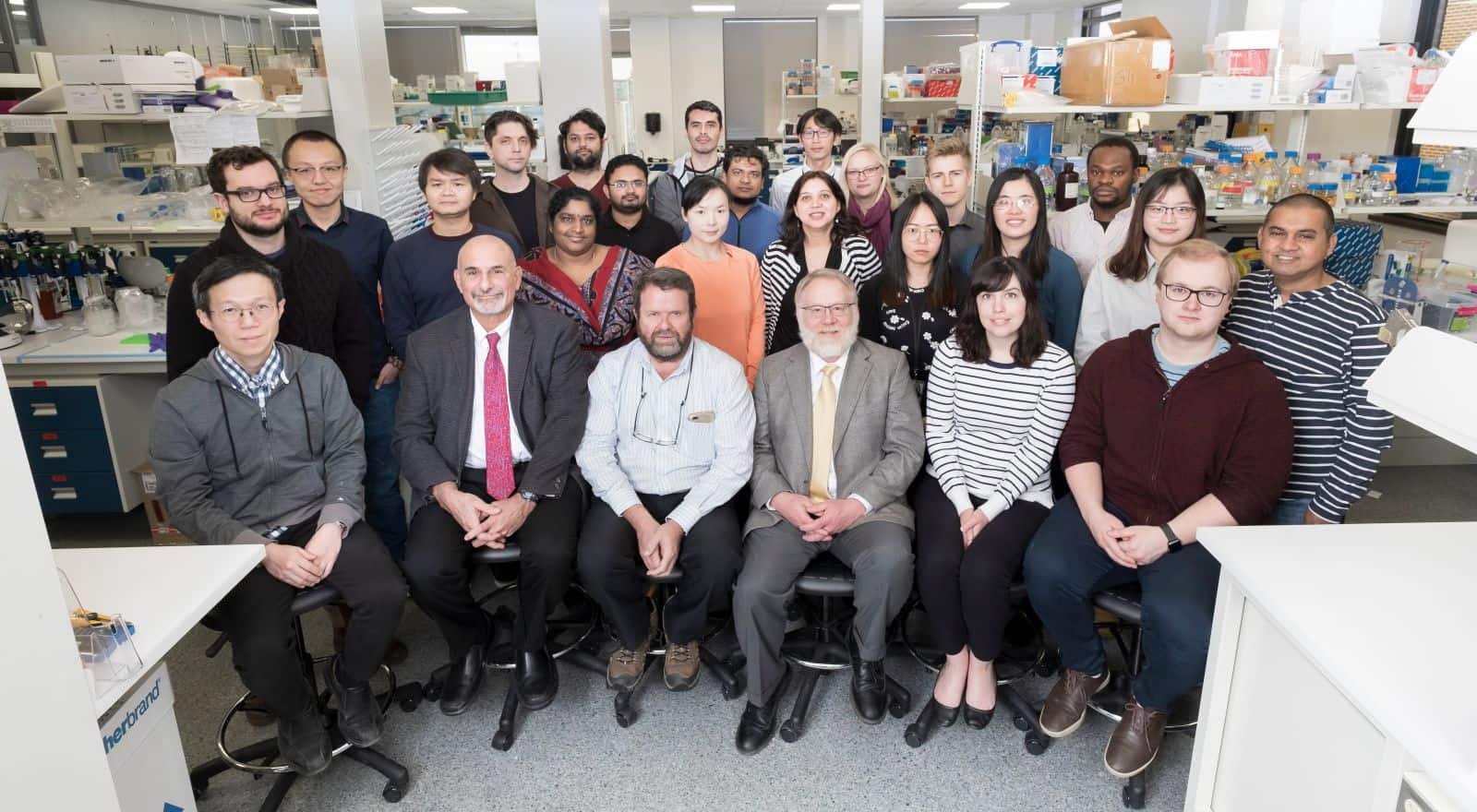
Back row, L to R: Rahul Chandnani, Javier Mora Macias, Mutsutomo Tokizawa.
Brendan Ashby, Karim Panjvani, Hasan Ahmed, Wendy Lyzenga, Grant Tingstad, Toluwase Olukayode.
Pierre-Luc Pradier, Tongfei Qin, Cuong Nguyen, Madhavi Daida, Jieyu Chen, Reshma Rizvi, Alex (Mengying) Liu, Li Liu, Yujie Pei, Pankaj Banik.
Front row, L to R: Brian (Byung-Kook) Ham, Leon Kochian, Emil Hallin, Dave Schneider, Megan Paul, Connor Burbridge.
Improving Crop Yields Through Root Physiology and the Soil Microbiome
Research focus: GIFS will examine the interaction between and among roots, soil and its micro-organismal complement, a dynamic ecosystem that has a substantial effect on soil fertility and crop health.
Micro-organisms in soil (bacteria, fungi, algae, etc.) are important because they affect soil structure and fertility.
Soil micro-organisms make up about 10% of the organic matter in soil. The remaining organic matter is impacted by these micro-organisms to determine the amount of nutrients available for plant growth.
Understanding the chemical signaling (or communication) that takes place between soil micro-organisms and roots is critical to increasing yields and to building sustainable cultivation systems.
GIFS will use DNA sequencing technologies to better understand and manipulate these interactions. Using technology from the Canadian Light Source (synchrotron) and the Sylvia Fedoruk Canadian Centre for Nuclear Innovation (cyclotron) at the University of Saskatchewan, GIFS will investigate root-soil-microbial interactions and develop intervention strategies.
Exploring and manipulating root growth and regulating the rhizosphere (the soil directly around the root that contains root secretions and soil micro-organisms) could increase water and nutrient absorption and reduce root dysfunction due to infection and disease, resulting in increased crop productivity.
Benefits to Farmers in both Developed and Developing Nations
- Improved drought tolerance
- Enhanced soil fertility and nutrient utilization
- Improved plant protection
- Increased crop productivity
Affects of Soil Quality and Fertility Issues
Soil quality and fertility issues are critical to both developed and developing nations, and GIFS’ research on the soil-root-microbial interface will make a powerful contribution to soil health worldwide.
In developed nations, efforts to improve crop yields can potentially have detrimental consequences for farmers. For example, intensive cultivation without appropriate rotation, excessive tilling and lack of replenishment of organic matter all contribute to soil degradation. In Western Canada, the biggest factor in soil remediation was the move to no-till agriculture in the late 1990s as herbicide-resistant canola became available.
In developing nations, drought combined with an inability to replenish organic matter in soil has resulted in severe degradation of soils to desert-like conditions in previously cultivated areas. Much of this damage can be reversed; however, it requires well-planned soil stewardship programs to preserve and remediate large areas of land in South Asia and sub-Saharan Africa.
The Global Impact of Soil Issues
- About 38% of the world’s cropland is affected by land degradation, which includes reduced water and nutrient availability.
- During the past 40 years, nearly one-third of the world’s cropland (1.5 billion hectares) has been abandoned because of soil erosion.
- The United States is losing soil 10 times faster than the natural replenishment rate. China and India are losing soil 30 to 40 times faster.
